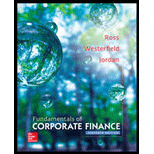
Fundamentals of Corporate Finance
11th Edition
ISBN: 9780077861704
Author: Stephen A. Ross Franco Modigliani Professor of Financial Economics Professor, Randolph W Westerfield Robert R. Dockson Deans Chair in Bus. Admin., Bradford D Jordan Professor
Publisher: McGraw-Hill Education
expand_more
expand_more
format_list_bulleted
Textbook Question
Chapter 19.5, Problem 19.5CCQ
Why are
Expert Solution & Answer
Want to see the full answer?
Check out a sample textbook solution
Students have asked these similar questions
A comparative balance sheet and income statement is shown for Cruz, Incorporated.
CRUZ, INCORPORATED
Comparative Balance Sheets
At December 31
2021
2020
Assets
Cash
Accounts receivable, net
$ 85,600
36,800
$ 21,300
Prepaid expenses
Inventory
Total current assets
Furniture
Accumulated depreciation-Furniture
Total assets
Liabilities and Equity
Accounts payable
Wages payable
77,100
45,200
84,900
4,700
3,900
204,200
155,300
94,700
(14,700)
$ 284,200
$ 13,400
8,000
(8,400)
$ 257,400
$ 19,000
4,500
110,500
Income taxes payable
1,400
2,500
Total current liabilities
Notes payable (long-term)
Total liabilities
Equity
Common stock, $5 par value
Retained earnings
22,800
26,000
28,900
66,400
51,700
92,400
204,000
28,500
162,300
2,700
Total liabilities and equity
$ 284,200
$ 257,400
CRUZ, INCORPORATED
Income Statement
Sales
For Year Ended December 31, 2021
$ 440,700
283,700
157,000
Cost of goods sold
Gross profit
Operating expenses (excluding depreciation)
Depreciation expense
Income before taxes…
How do you calculate the intrinsic value of a stock using the dividend discount model (DDM)? Need help.
Explain the Modigliani-Miller theorem and its assumptions In finance?
Chapter 19 Solutions
Fundamentals of Corporate Finance
Ch. 19.1 - What is the transaction motive, and how does it...Ch. 19.1 - What is the cost to the firm of holding excess...Ch. 19.2 - Which would a firm be most interested in reducing,...Ch. 19.2 - Prob. 19.2BCQCh. 19.2 - Prob. 19.2CCQCh. 19.3 - Prob. 19.3ACQCh. 19.3 - Prob. 19.3BCQCh. 19.4 - Prob. 19.4ACQCh. 19.4 - What is a zero-balance account? What is the...Ch. 19.5 - What are some reasons why firms find themselves...
Ch. 19.5 - Prob. 19.5BCQCh. 19.5 - Why are money market preferred stocks an...Ch. 19.A - Prob. 1ACQCh. 19.A - Prob. 2BCQCh. 19.A - Describe how the MillerOrr model works.Ch. 19.A - Changes in Target Cash Balances Indicate the...Ch. 19.A - Using the BAT Model Given the following...Ch. 19.A - Prob. 3QPCh. 19.A - Prob. 4QPCh. 19.A - Determining Optimal Cash Balances The All Day...Ch. 19.A - Prob. 6QPCh. 19.A - Prob. 7QPCh. 19.A - Interpreting MillerOrr Based on the MillerOrr...Ch. 19.A - Prob. 9QPCh. 19.A - Using BAT Rise Against Corporation has determined...Ch. 19 - Prob. 19.1CTFCh. 19 - Prob. 19.2CTFCh. 19 - Prob. 19.3CTFCh. 19 - Prob. 1CRCTCh. 19 - Prob. 2CRCTCh. 19 - Prob. 3CRCTCh. 19 - Prob. 4CRCTCh. 19 - Prob. 5CRCTCh. 19 - Prob. 6CRCTCh. 19 - Collection and Disbursement Floats [LO1] Which...Ch. 19 - Prob. 8CRCTCh. 19 - Prob. 9CRCTCh. 19 - Prob. 10CRCTCh. 19 - Prob. 11CRCTCh. 19 - Prob. 12CRCTCh. 19 - Prob. 13CRCTCh. 19 - Prob. 1QPCh. 19 - Calculating Net Float [LO1] Each business day, on...Ch. 19 - Prob. 3QPCh. 19 - Float and Weighted Average Delay [LO1] Your...Ch. 19 - NPV and Collection Time [LO2] Your firm has an...Ch. 19 - Using Weighted Average Delay [LO1] A mail-order...Ch. 19 - Prob. 7QPCh. 19 - Lockboxes and Collections [LO2] It takes Cookie...Ch. 19 - Prob. 9QPCh. 19 - Prob. 10QPCh. 19 - Prob. 11QPCh. 19 - Calculating Transactions Required [LO2] Cow Chips,...Ch. 19 - Prob. 1MCh. 19 - Prob. 2MCh. 19 - Prob. 3M
Knowledge Booster
Learn more about
Need a deep-dive on the concept behind this application? Look no further. Learn more about this topic, finance and related others by exploring similar questions and additional content below.Similar questions
- How do you calculate the intrinsic value of a stock using the dividend discount model (DDM)? i need coarrow_forwardHow do you calculate the intrinsic value of a stock using the dividend discount model (DDM)?arrow_forwardHow does the weighted average cost of capital (WACC) affect a company’s valuation? i need help in this qarrow_forward
- How does the weighted average cost of capital (WACC) affect a company’s valuation?i need correct answer.arrow_forwardHow does the weighted average cost of capital (WACC) affect a company’s valuation?i need help.arrow_forwardHow does the weighted average cost of capital (WACC) affect a company’s valuation? Need helparrow_forward
arrow_back_ios
SEE MORE QUESTIONS
arrow_forward_ios
Recommended textbooks for you
 EBK CONTEMPORARY FINANCIAL MANAGEMENTFinanceISBN:9781337514835Author:MOYERPublisher:CENGAGE LEARNING - CONSIGNMENT
EBK CONTEMPORARY FINANCIAL MANAGEMENTFinanceISBN:9781337514835Author:MOYERPublisher:CENGAGE LEARNING - CONSIGNMENT Intermediate Financial Management (MindTap Course...FinanceISBN:9781337395083Author:Eugene F. Brigham, Phillip R. DavesPublisher:Cengage Learning
Intermediate Financial Management (MindTap Course...FinanceISBN:9781337395083Author:Eugene F. Brigham, Phillip R. DavesPublisher:Cengage Learning Cornerstones of Cost Management (Cornerstones Ser...AccountingISBN:9781305970663Author:Don R. Hansen, Maryanne M. MowenPublisher:Cengage Learning
Cornerstones of Cost Management (Cornerstones Ser...AccountingISBN:9781305970663Author:Don R. Hansen, Maryanne M. MowenPublisher:Cengage Learning



EBK CONTEMPORARY FINANCIAL MANAGEMENT
Finance
ISBN:9781337514835
Author:MOYER
Publisher:CENGAGE LEARNING - CONSIGNMENT

Intermediate Financial Management (MindTap Course...
Finance
ISBN:9781337395083
Author:Eugene F. Brigham, Phillip R. Daves
Publisher:Cengage Learning

Cornerstones of Cost Management (Cornerstones Ser...
Accounting
ISBN:9781305970663
Author:Don R. Hansen, Maryanne M. Mowen
Publisher:Cengage Learning

Framing Effect: Facts vs Half-Truths & Manipulation; Author: UKspreadbetting;https://www.youtube.com/watch?v=aMNOp9qMA2I;License: Standard youtube license